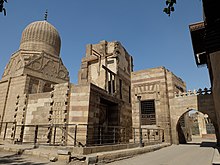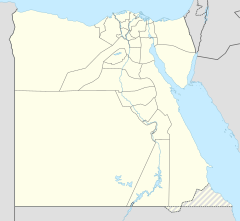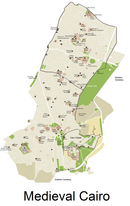Mausoleum of Tarabay al-Sharifi
| Mausoleum of Tarabay al-Sharifi | |
|---|---|
 | |
| Religion | |
| Affiliation | Islam |
| Region | Africa |
| Patron | (amir) Tarabay al-Sharifi |
| Location | |
| Location | Bab al-Wazir Cemetery, al-Darb al-Ahmar, Cairo, Egypt |
| Geographic coordinates | 30°02′04″N 31°15′39″E / 30.034555°N 31.260918°E |
| Architecture | |
| Type | Mausoleum, sabil, kuttab |
| Style | Mamluk, Islamic |
| Completed | 1503-04 |
| Specifications | |
| Dome(s) | 1 |
| Materials | stone |
The Mausoleum of Tarabay al-Sharifi is a late Mamluk funerary complex in Cairo comprising the tomb of amir Tarabay al-Sharifi as well as a sabil and kuttab (primary school), built in 1503–1504.[1] It is located in the Bab al-Wazir Cemetery on the edge of the Darb al-Ahmar district of historic Cairo. An adjacent gate gives access from this district to the rest of the cemetery. It is considered a good example of late Mamluk architecture, combining artistic and ornamental sophistication with practical functionality in the arrangement of its different elements.[1]

Amir Tarabay was a mamluk slave purchased by Qaytbay who served as leader of the mamluks in Egypt under the reign of Sultan al-Ghuri (1501–1516).[1][2]
Also adjacent and attached to the same site is the ribat and mausoleum of Azdumur, built in the same period.[1] Azdumur was another mamluk purchased by Qaytbay, though it is unclear what relationship existed, if any, between him and Tarabay.[2]
The site was restored between 2006 and 2009 by the Aga Khan Trust for Culture, which has carried out other conservation initiatives in the Darb al-Ahmar area of Cairo.[2]



